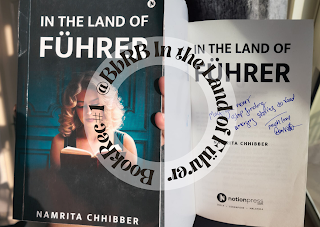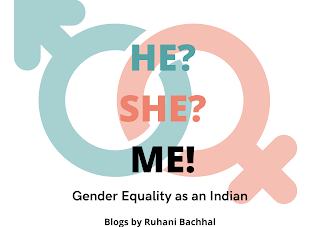BookRec #1 | In the Land of Führer
Hey history-buffs and bibliophiles, gather up! Welcome to the first post of the BookRec@BbRB Series, where I will discuss briefly/broadly the anatomy of books I have read.
The book on the table today goes by the title- 'In the Land of Führer' written by Namrita Chhibber as a debut work in the field of her passion. The 346 pages' novel is divided into two timelines and three sections (present-past-present). It is a fine work of historical fiction settled in the Nazi regime that revolves around friendships curated-fallen down-patched; unlikely friendships in unlikely places in unlikely times. The author beautifully captures it all.
How did I decide to read this?
It started on the morning of March 2nd, 2024 at TieCon Chandigarh 2024. TieCon Chd 2023 was a fantastic event where I first participated as a delegate, and as luck had it, got a signed copy of a thrilling autobiography from a celebrated personality there. I was determined for a riveting incidence this time too. That's when I came across Namrita Chhibber's booth! We chatted about her journey starting from her early teenage years when she would draft short stories and entries at the back of her notebooks to publishing her first novel in October 2023. Her stunning energy made it irresistable to purchase a signed copy of her book.
She is a ponderer, a sonder-er and a history-buff; the essence of which has been beautifully produced in the story narrated in her book.
Summary
The story unfolds next to a nervous, whimpering Agnes Born whose reluctance to come back to Germany for a few days after having long ago moved to New York aggravates her mental unrest. Staying in an old duplex in Potsdam that had survived World War II, she craved for a flight back to the NYC super ASAP; despite the affair of visit being her younger brother's wedding. Destructive she became, as the 'unrest' took a toll on her, and she destroys the glass window and sets the flooring of her room on fire. And as fate had it, she ends up dicovering a buried diary, or what was left of it, from under the disrupted wooden parquet. Agnes was a lost cause, an alcohol abuser and a failed lover, but the diary emerged to be her silver lining; I didn't find this diary for no reason.
Flipping across the torn shrivelled pages made it clear that it was an ancient piece which survived the Nazi regime, but its owner was not a Jew; why then was it buried?
Agnes discovers a purpose, a purpose in finding the owner and asking her about the war, the people mentioned in her entries, and her hate for Hitler. On her hunt, she meets Rudy, the owner of the house, who tells Agnes about the diary being his beloved friend Augusta's, Augusta Knotch's. Realizing that the trail she had taken was more untrodden than she could think of, she seeks the expertise of a History Professor and finds her- Alia Aldmann, who used to be Agnes' best friend.
The story goes steeper with the present day chemistry between Agnes and Alia; besties turned strangers, or worse, stuck in a bestie-feud.
The trail pauses and begins again at Natalie Nuchem, a survivor Jew who shared an intimate bond with Augusta; an unannounced friendship carried through an insecurity of being caught, for, Augusta was an Aryan serving Hitler while Natalie was a Jewish slave.
Natalie was a rebel to the Jewish curfew in the non-ghetto days, since she was 13. After 8 p.m., she would be out in the dark streets of Berlin searching for food, however, mainly to enjoy the Aryan-level freedom. Then came the sombre ghetto days. Natalie's only family, her mother, passes away, yet her rebellion does not reconcile. At night, she would jump across the ghetto walls, take a stroll across the city, jump across the same walls back, careful not to attract any Nazi. All this while, Natalie had Augusta on her mind. She would see her at her workplace while working in the kitchen as a Jewish slave. At midnight, they met in park, sat on bench and talked about life after war. We were just two girls, who dreamed, dreamed of a future without Hitler.
To Natalie, Augusta was the ideal sort, a blue-eyed blonde Aryan with good clothes and wit. She admired that beauty-with-brains. Yet, Augusta was a grey character, a mystery unexplored, a Pandora's Box unopened. Gradually, they grew close and eventually, Natalie became the first one to know Augusta's story.
The strong, fierce 19 years old had a tale untold.
Natalie continuously risked her life, almost each night to taste freedom, to see Augusta. Yet, one night, her risk took her down, robbed her away of her dignity. She stopped going out, stopped seeing Augusta and Augusta blamed herself, because Natalie Nuchem was her first and only friend who was now hurt.
After that, Augusta gave her all possible self into securing Natalie's life, and at last, got lost in anchoring Natalie and her friend.
Augusta succeeded, for Natalie settled and now lived a posh oldhood, but Augusta herself was never found again, not by anyone. Was she gassed for helping a Jew? Did she perish?
Natalie had spent rest of her life finding the answers to these, unfortunately, she failed. She was never heard before by anyone other than Agnes and Alia, and wanted them to help her.
After having dug this deep together, Agnes and Alia did not want to leave the trail without finding out what happened to Augusta. They did find out. Adding to the captivating elements was the justificaion of Augusta's life after war by Alia, not as a historian but as a mother.
But that wasn't all, the trail didn't just complete one story of friendship, but two. The cracks were filled with answers, testimonies and conclusions, and were repaired, just as in kintsugi.
And that's how Namrita Chhibber's novel is delicately woven between two timelines reaching their own epilogues, by and by.
Key Takeaways
It is a subtle narrative, nonetheless, its storyline will leave you wondering about the complex of pseudo-Nazis in the Third Reich, how Nazism shut everyone with the fear of death and the number of Aryans who loathed themselves.
Throughout the two timelines and three sections of the novel, one thing stands aloft: Communication is Key. Whether it was Agnes and Alia or Natalie and Augusta, their friendships survived only if they conversed. This applies to all interpersonal relationships in life, because a cold war empties a person in a way hot war never could.
This was actually the fastest I've ever read a book (finishing it in less than a week) and the first time I could completely absorb a novel with that pace. Chhibber's debut novel stands as a specimen to the entirety and devotion that budding authors pour into their first works.
Namrita's Instagram handle: @namchhibber
Link to her book: In the Land of Führer on Amazon
That was all for this post, I believe. Remember, don't hesitate to buy this paperback even if you have only a faint idea about Nazism.
*Entirely not sponsored.*
Thanks a ton, folks. Until next time!
!Smiles!
~Ruhani Bachhal



Amazing Write up👍❤️
ReplyDeleteOMG! Your blog is captivating enough for me to buy this book!! 😀
ReplyDeleteI'm sure this series will help us realise the need to promote young authors...the book sounds amazing as it is. Great work!
ReplyDelete